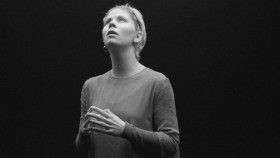Titlen kan læses som et postulat, men den holder, hvad den lover. Filmen søger, men den finder også i sin konstruktion, sin forsøgsopstilling dette sted og handler altså om hvor i hvert fald bestemte lyde, dem sangerne skaber poesi af, kommer fra. Det er klassisk som opskrift, en film finder sit sted og det steds drama og dets nætter og dage bliver filmen, og således her også sanglydens sted.
Det er manden som spørger og kvinden som finder lydens sted i sangerens krop helt ud i neglene og det er kvinden som demonstrerer det, kvinden som er sikker. Tvivlen findes hos ham, kravene er hans, det er ham som stiller reglerne op. To stærke steder i forløbet anklager hun ham for at tale nedad. Selv er hun suveræn, ved hvad hun vil, hvor målet er, hvor stedet er.
Nu ved jeg ikke om der er særlige regler for hvad en afgangsfilm skal indeholde, den er vel ikke kun afgangsprojekt for instruktøren, også for de andre på holdet, fotografen (kameraernes placering, lyssætningen), klipperen (fortællerytmen, her dagens forløb, øvelsesrækkens forløb), komponisten (musikkens lyd i forhold lyddesign og – specielt krævende her – til sangens lyd). Instruktøren har måttet administrere den enkelte medarbejders lyst til i en eksamenssituation at yde noget særligt, vise hele sit repertoire og bøje den ambition ind i sin historie.
Dertil kommer at den historie her er etableret i en flerkameraproduktion, jeg forstår det ikke i traditionel form er en film, men et kunstnerisk mere end journalistisk bud på et tv-program, en reportage godt nok fra en øvedag på den nøgne scene men også en personlig skildring, et portræt af to kendte kunstnere, begge fremragende sangere og performere, som det forudsættes tv-seerne ved noget om i forvejen og ønsker at få mere at vide om, mere end seerne er optaget af filminstruktørens / tilrettelæggerens / det tekniske holds kunstneriske, journalistiske og håndværksmæssige problemstilling. Der er meget at holde styr på, og det lykkes, filmen er helstøbt og fascinerende.
Hertil kommer de to medvirkende sangere og performere som sikkert også har en egen dagsorden, som arbejder med en forestilling, træner, øver sig, afprøver forløb på en scene foran en tom teatersal. De er også, måske i begge virkeligheder to elskende som skal være i balance i forhold til min optagethed. Men er de det? Er kvinden her ikke stærkere end manden, når der vejes af på milligramvægten? Jeg oplever en ubalance som næsten vælter forløbet, eller charmeres jeg blot af hendes udsøgt velskabte fuglekvidder, af hendes udsøgt velskabte sætninger, hvor andre måske charmeres af mandens mere realistisk dagligdags fremtoning, hans instruktør- og erfarne lærerattityde. Det gør mig usikker på om der er tilstrækkeligt stof i manuskriptet eller om der overlades vel meget til de medvirkendes improvisation, og her er hun hurtigst, mest opfindsom og tillige strengest. Hendes strengere krav samler min interesse og sympati.
SYNOPSIS
En mand og en kvinde på rejse der hvor lyden skabes. (Filmskolens program)
”Grundlæggende er det en kærlighedshistorie: Om at se hinanden eller ikke at se hinanden. Om de forestillinger, man kan have om den anden, eller om man bare ser sig selv i den anden. Og så er det en fortælling om to fantastiske mennesker.” (Instruktøren til Ekko)
CREDITS
Instruktør: Tilde Trampedach Juul, medvirkende: Mija Milovich, Michael Rexen, fotograf: Annika Aschberg, klipper: Lars Sigsgaard Berg, tonemester: Stefan Garfield Rasch Holm, production design: Bertan Comert og Bogdan Stamatin, produktion og distribution: Den danske Filmskole.
http://www.filmskolen.dk/presse/afgangsfilm/dokumentar/2015/



